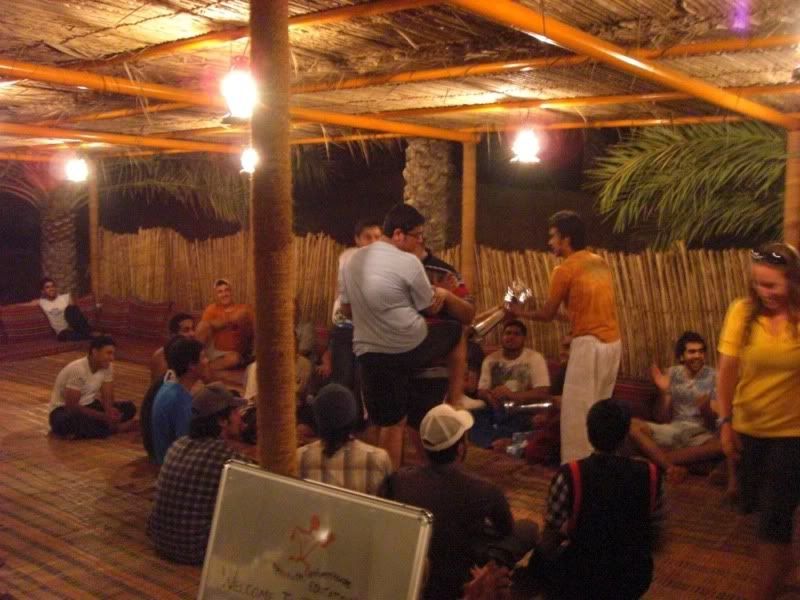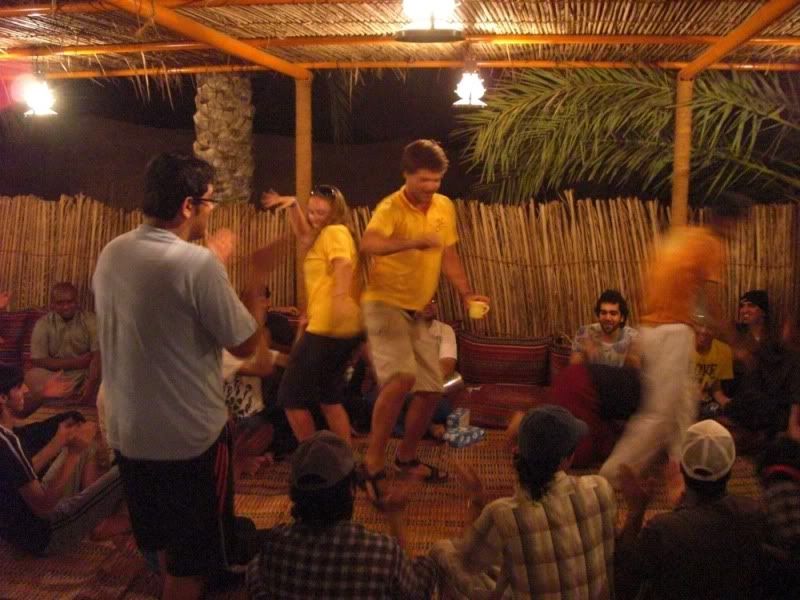After the locals left for their first activity, a German international school of 14-year-old coeds arrived. It would have been very inappropriate for both schools to stay in camp together, so we sent the Germans to camp out on the beach, which they were thrilled to do.
Mike stayed with the German group and the rest of us had dinner with the Emeratis. After dinner, they brought out two doumbeks and formed a drum circle. Most of the guys knew every word to every song. Randomly, guys would jump up in the middle of the circle to dance. Sometimes they shimmied and writhed like belly-dancers and other times they would dance provocatively with they pelvises moving close to the ground, no need for interpretation. Everyone was enthusiastic and loud, clapping, singing, drumming and yelling. Their Egyptian teacher stopped them momentarily to explain to us what was going on. He said that often at weddings one of the families would hire a troop of dancers and drummers. Usually the dancers are men dressed as women. I think once in a while there may be a woman dancer, who would dress up to look androgynous so no one could tell. The troop was paid to come and the dancers were tipped with money as they danced. Apparently this line of work is pretty lucrative. This tradition is quite taboo but happens more frequently than is admitted to. After the explanation, the music continued. The guys were talented dancers, with phenomenal rhythm and body control. The largest, heaviest guy could shimmy like a professional belly dancer. There were five or six other guys who would randomly jump up to dance who were also quite talented.

I was very impressed. We (the westerners) sat in the circle smiling and clapping along. They kept pulling our arms upward saying “miss miss, you dance!” We just shook our heads, not sure whether we would be inappropriate or not. Finally Micah stood up and jumped into the circle to dance. He lightheartedly booty danced in the center which made everyone erupt into laughter. Jesi didn’t want to dance, so she picked up a tabla and participated in the drumming. As the night grew later, those of us who weren’t spending the night at the plantation needed to leave. I was so hesitant to leave the music and the singing. For one last hoorah, Micah and I jumped into the center, dancing with our backs to each other. Micah booty danced and I belly danced. You could tell the locals were thrilled with our willingness to participate as the excitement and volume heightened.

When we had danced our fill we jumped back out of the circle and soon the song ended. We were constantly thanked and congratulated as we gathered our things to leave. To Micah, they expressed gratitude for embracing their culture. I think he felt a sense of brotherhood. They all made me feel like a queen. The best moment was when the heavier Emerati guy who was the best dancer came over to me to tell me what he thought of my dancing. I wish they had stayed a second night.
Micah, Jesi and I drove into town to go to the internet café. We stopped to get gas and ran into Ahmed, the landlord of the plantation. He invited us to his home for Arabic coffee. He lives right next to the border in a fairly large traditional home with his wife and four children. We sat in a sitting room, complete with large plush couches and very elaborate curtains. Ahmed brought out first sweets, a tray of very nice creme caramel and bowls of jello. We ate all of it before the coffee. Arabic coffee is brought out in a traditional vessel that looks like a very tall and thin tea pot. The coffee is served much like tea is in Japan, in tiny little ceramic cups that you sip from. The coffee is much lighter and clearer than in the west, no where near as dark, and is made with lots of cardamom. When you are invited to someone's home for coffee, it is rude to only have one cup, and selfish or indulgent to have three. So we each had two cups. We chatted with Ahmed about everything from the politics of Oman and the UAE to the meaning of various Arabic words we had heard frequently. Jesi and I scrambled to write them down when we got to the car. We've got hello, thank you, left, right, you're welcome, my love/life, lets go, go, enough, no thank you, various articles of clothing and mountain climbing well enough to use frequently. We use as much as we can as often as we can, but so many people here speak such good English we haven't really been forced to learn much.





